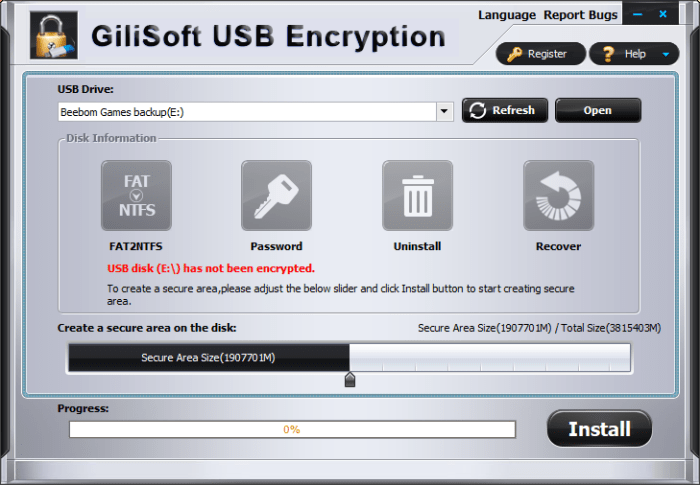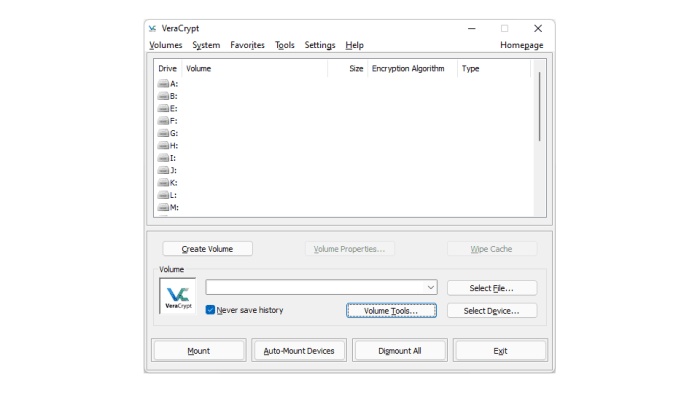Best encryption software for external hard drive – Protecting your sensitive data stored on external hard drives is paramount in today’s digital landscape. Whether you’re dealing with personal photos, financial records, or confidential work documents, robust encryption is essential. This comprehensive guide explores the best encryption software options available, helping you choose the right solution for your needs. We’ll delve into various features, security protocols, ease of use, and compatibility to ensure you make an informed decision.
We’ll also cover crucial aspects like key management, hardware vs. software encryption, and best practices for data security.
Understanding the Need for External Hard Drive Encryption
External hard drives, while convenient for storage and data transfer, are vulnerable to theft, loss, and unauthorized access. Without encryption, sensitive data becomes easily accessible to anyone who gains physical possession of the drive. Encryption transforms your readable data into an unreadable format (ciphertext) using a cryptographic key. Only individuals possessing the correct decryption key can access the original data.
This crucial layer of security safeguards your information from prying eyes.
Types of Encryption: Hardware vs. Software
You have two primary choices when it comes to encryption: hardware and software solutions. Hardware encryption utilizes a dedicated encryption chip built into the hard drive itself. This offers a high level of security as the encryption process happens at the hardware level, making it more resistant to certain attacks. Software encryption, on the other hand, relies on software installed on your computer to encrypt the data before it’s written to the drive.
Software solutions are generally more flexible and often support a wider range of operating systems.

Source: beebom.com
Top Encryption Software for External Hard Drives: Best Encryption Software For External Hard Drive
Choosing the right software depends on your specific requirements, technical expertise, and budget. Here are some of the leading contenders:
1. VeraCrypt
VeraCrypt is a free, open-source disk encryption software based on the legacy TrueCrypt project. It’s highly regarded for its robust security, cross-platform compatibility (Windows, macOS, Linux), and ease of use. VeraCrypt allows you to create encrypted containers or encrypt entire partitions or drives. Its strong encryption algorithms, including AES, Serpent, and Twofish, provide excellent data protection.
- Pros: Free, open-source, cross-platform, strong encryption, user-friendly interface.
- Cons: Can be slightly more complex for beginners than some proprietary solutions.
2. BitLocker (Windows), Best encryption software for external hard drive
Built into Windows Pro and Enterprise editions, BitLocker offers robust full-disk encryption. It’s a convenient option if you primarily use Windows and appreciate the seamless integration with the operating system. BitLocker provides strong protection against unauthorized access and can be configured with various security measures, including TPM (Trusted Platform Module) integration for enhanced security.
- Pros: Integrated into Windows, strong encryption, TPM support.
- Cons: Only available on Windows Pro and Enterprise, not suitable for other operating systems.
3. FileVault (macOS)
Similar to BitLocker, FileVault is Apple’s built-in disk encryption utility for macOS. It provides full-disk encryption, protecting your data even if your Mac is lost or stolen. FileVault is easy to use and integrates seamlessly with the macOS environment.
- Pros: Integrated into macOS, user-friendly, strong encryption.
- Cons: Only works on macOS, not cross-platform.
4. Disk Utility (macOS)
macOS also includes a built-in Disk Utility that offers encryption capabilities. While not as feature-rich as FileVault, it provides a simple way to encrypt individual volumes or partitions. This is a good option for users who need basic encryption without the complexities of other solutions.
- Pros: Simple to use, built-in to macOS.
- Cons: Less feature-rich than FileVault, may not offer the same level of security.
5. Sophisticated Encryption Solutions (e.g., PGP, GPG)
For users who require extremely high levels of security and are comfortable with more technical solutions, Pretty Good Privacy (PGP) and GNU Privacy Guard (GPG) offer powerful file and email encryption. While not specifically designed for whole-disk encryption, they can be used to encrypt individual files and folders on your external drive, offering an additional layer of security.
- Pros: Extremely strong encryption, widely used for secure communication.
- Cons: Steeper learning curve, not as user-friendly as other options.
Choosing the Right Encryption Software: Key Considerations
Several factors should guide your choice:
- Operating System Compatibility: Ensure the software supports your operating system(s).
- Encryption Strength: Look for software using strong, widely accepted encryption algorithms like AES-256.
- Ease of Use: Choose a solution that aligns with your technical skills. Some are more user-friendly than others.
- Key Management: Understand how the software manages encryption keys. Losing your key means losing access to your data.
- Cost: Consider whether you need a free, open-source solution or a paid, commercial product.
Best Practices for External Hard Drive Security
Beyond encryption, implement these additional security measures:
- Strong Passwords: Use long, complex, and unique passwords for your encryption keys.
- Regular Backups: Back up your encrypted data to a separate location to prevent data loss.
- Physical Security: Protect your external hard drive from theft or physical damage.
- Software Updates: Keep your encryption software up-to-date with the latest security patches.
Frequently Asked Questions (FAQ)
- Q: Is hardware or software encryption better? A: Both have advantages. Hardware encryption is generally considered more secure, while software encryption offers more flexibility and cross-platform compatibility.
- Q: What happens if I lose my encryption key? A: You will lose access to your encrypted data. Therefore, securely storing your key is crucial.
- Q: Can I encrypt only specific files or folders? A: Yes, many software solutions allow you to encrypt individual files, folders, or entire drives.
- Q: How long does encryption take? A: The time it takes depends on the size of the data being encrypted and the speed of your computer.
- Q: Is encryption enough to protect my data? A: While encryption is a vital security measure, it should be combined with other best practices, such as strong passwords and physical security.
Conclusion
Protecting your data on external hard drives is crucial. Choosing the right encryption software and implementing best practices ensures your sensitive information remains safe and secure. Consider your needs, technical expertise, and budget when making your decision. Remember, data security is an ongoing process, requiring vigilance and proactive measures.
Call to Action
Ready to secure your valuable data? Download and install a reputable encryption software today and take control of your digital security!
Question Bank
What are the different types of encryption algorithms used in external hard drive encryption software?
Common algorithms include AES (Advanced Encryption Standard), which is widely considered secure, and others like Twofish and Serpent. The strength of the algorithm is usually measured in bits (e.g., AES-256 is stronger than AES-128).
Is it necessary to encrypt a hard drive containing only personal photos and videos?

Source: lifewire.com
While the risk might seem lower, encryption is still recommended for personal data. Loss or theft can have significant consequences, and encryption provides an added layer of protection against unauthorized access.
How do I choose between hardware and software encryption?
Hardware encryption, often built into the drive itself, is generally considered more secure as it’s less vulnerable to software-based attacks. Software encryption is more readily available and often more affordable.
What happens if I forget my encryption password?
Data recovery is extremely difficult, if not impossible, without the correct password. Choose a strong password you can remember, or use a secure password manager.
